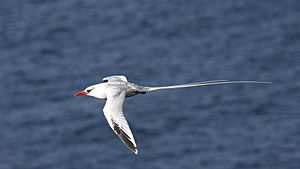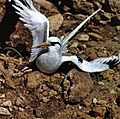Tropicbird facts for kids
Quick facts for kids TropicbirdsTemporal range: Early Eocene to present
|
|
|---|---|
 |
|
| Red-billed Tropicbird | |
| Scientific classification |
|
| Kingdom: | Animalia |
| Phylum: | Chordata |
| Class: | Aves |
| Order: | Phaethontiformes |
| Family: | Phaethontidae |
| Genus: | Phaethon Linnaeus, 1758 |
| Type species | |
| Phaethon aethereus |
|
| Species | |
| Synonyms | |
|
|
Tropicbirds are amazing seabirds that live in the tropical parts of the world, especially over the open ocean far from land. They are called pelagic birds because they spend most of their lives flying over the sea. There are three different kinds, or species, of tropicbirds alive today. Long ago, scientists thought they were related to pelicans and cormorants, but now we know they belong to their own special group.
Contents
About Tropicbirds
Tropicbirds are known for their beautiful, long tail feathers. These feathers can be twice as long as their body! They are medium-sized birds, usually white with some black markings. Their beaks are strong and pointed, perfect for catching fish.
What They Look Like
Each of the three tropicbird species has its own unique look:
- The Red-billed Tropicbird has a bright red beak and two very long white tail streamers.
- The Red-tailed Tropicbird has a red beak and two long, thin red tail feathers.
- The White-tailed Tropicbird has a yellow or orange beak and two long white tail feathers.
All tropicbirds have webbed feet, which help them swim, but they are not very good at walking on land.
Where They Live
Tropicbirds live in warm, tropical oceans around the world. You can find them in the Atlantic, Pacific, and Indian Oceans. They spend most of their time flying over the open water, looking for food. They only come to land to nest and raise their young.
What They Eat
Tropicbirds are skilled hunters. They mostly eat fish and squid. They catch their food by diving headfirst into the water from high in the air. They are very fast and can plunge deep to grab their prey.
Life Cycle
Tropicbirds usually nest on remote islands or cliffs, away from predators. They don't build fancy nests; often, they just lay their single egg in a small dip on the ground or in a rock crevice. Both parents take turns sitting on the egg and feeding the chick once it hatches. The chick grows quickly, and soon it will be ready to fly out to sea and begin its own life as a pelagic bird.
Images for kids
-
A white-tailed tropicbird in the Seychelles
-
Red-tailed tropicbird at Midway Atoll
 | Jessica Watkins |
 | Robert Henry Lawrence Jr. |
 | Mae Jemison |
 | Sian Proctor |
 | Guion Bluford |




